In Greater Hinggan Mountains: Village of Hunters Makes Happy Home for Oroqen People
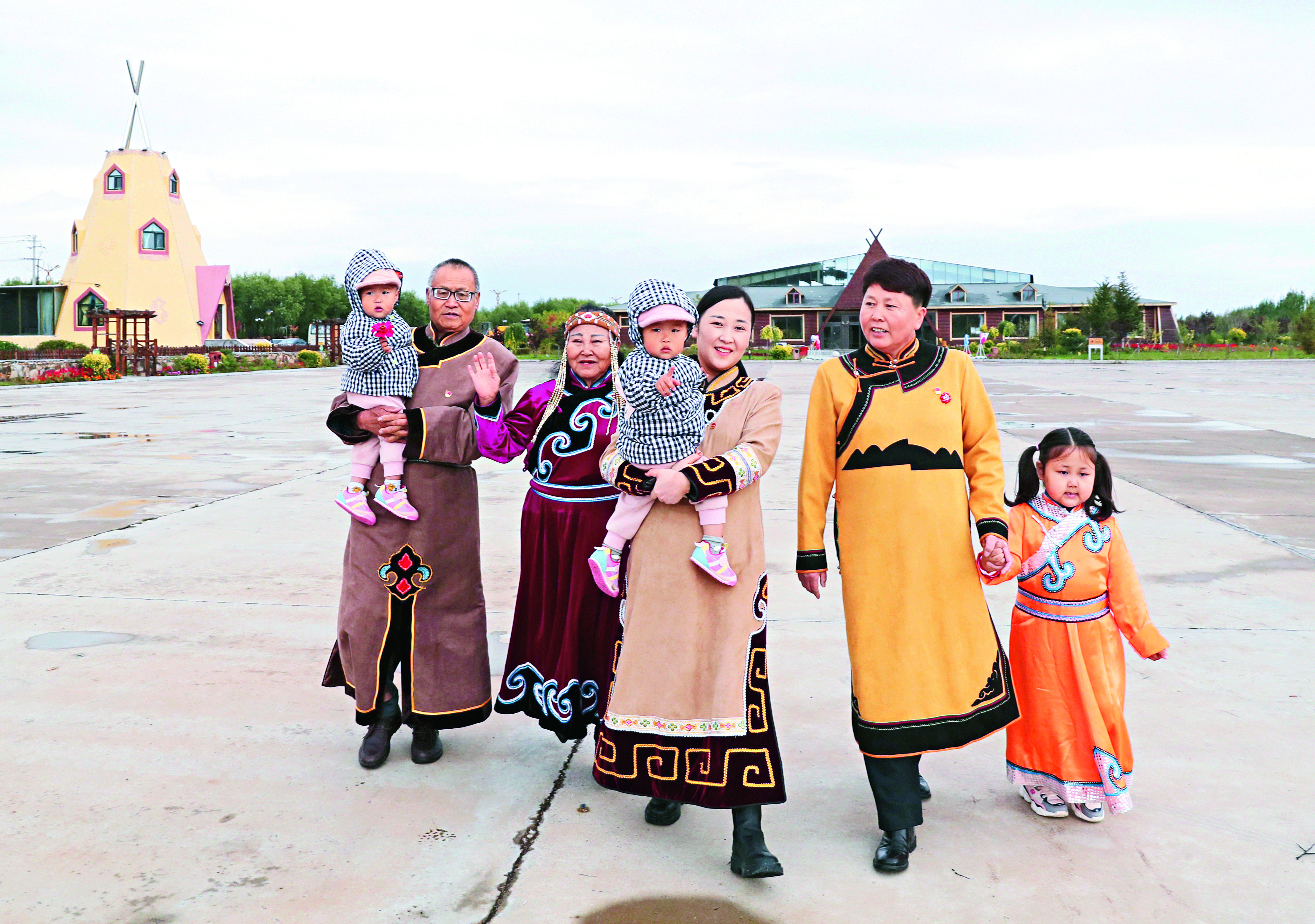 |
| A photo of Meng Yajing's family |
Meng Yajing, 46, used to be the secretary of the Party branch of Duobukuer Hunting Village in Dayangshu Town, in Oroqen Autonomous Banner, Hulunbeier City, North China's Inner Mongolia Autonomous Region. As a descendant of former hunters, she has seen how the Oroqen people have found prosperity alongside the rest of the nation.
'Without the Leadership of the Party, How Could There Ever Be a Well-off Life for People of All Ethnic Groups?'
As one of the three small ethnic minority groups (Oroqen, Daur and Ewenki) in Inner Mongolia, the Oroqen people used to reside in the Hulunbeier area, living a simple, isolated hunters' life in the Greater and Lesser Hinggan Mountains.
"Previous generations lived in a close-off and backward ravine. Their living conditions were very basic; even the tableware was hand-made. Access to medical care was nonexistent." Meng said it was the firm leadership of the Communist Party of China (CPC) that helped the Oroqen people give up their nomadic lifestyle in 1958 amid a historic leap forward in quality of life, social reform and means of production.
Meng, born in 1975 to a happy Oroqen family in the Chaoyang Hunting Group (renamed Chaoyang Hunting Village in 1984) in the Duobukuer river basin, had a skilled hunter father and a mother who was known in the village for her dexterity and capability as a housekeeper.
Since the 1950s, with the support of the CPC and the Chinese Government, hunters have left the mountains and moved to new homes, putting an end to their primitive lifestyle and bringing them into the modern world.
At around the age of 3 or 4, both of Meng's parents passed away, and she was brought up by her grandmother. "My grandma loved me deeply and always put me before herself. Her biggest wish was that I live a good life after I grew up," Meng recalled.
At the age of 6, Meng was sent to a nursing home in Alihe Town, also in Oroqen Autonomous Banner, where she was able to attend school. She lived there until she graduated from high school.
"Thanks to the Party's policies regarding ethnic minorities, primary and secondary school students of Oroqen descent enjoyed free education. When I was young, I was in poor health and even took a break from school, but I had a relatively happy childhood in the nursing home and at the home of my adoptive parents." Meng also recalled that after she graduated from high school in 1994, she returned to Chaoyang Hunting Village, where she was born and raised, and became a village cadre.
In 2002, Meng was elected secretary of the village Party branch and head of the village committee, both posts which she held for 20 years. Leading the villagers to follow the Party wholeheartedly, Meng became an excellent and loyal Party member and a cadre with a great sense of responsibility.
"Without the prosperity of the country, how could there ever be happiness for the people? Without the leadership of the Party, how could there ever be a well-off life for all ethnic groups?" Meng often says to the villagers.
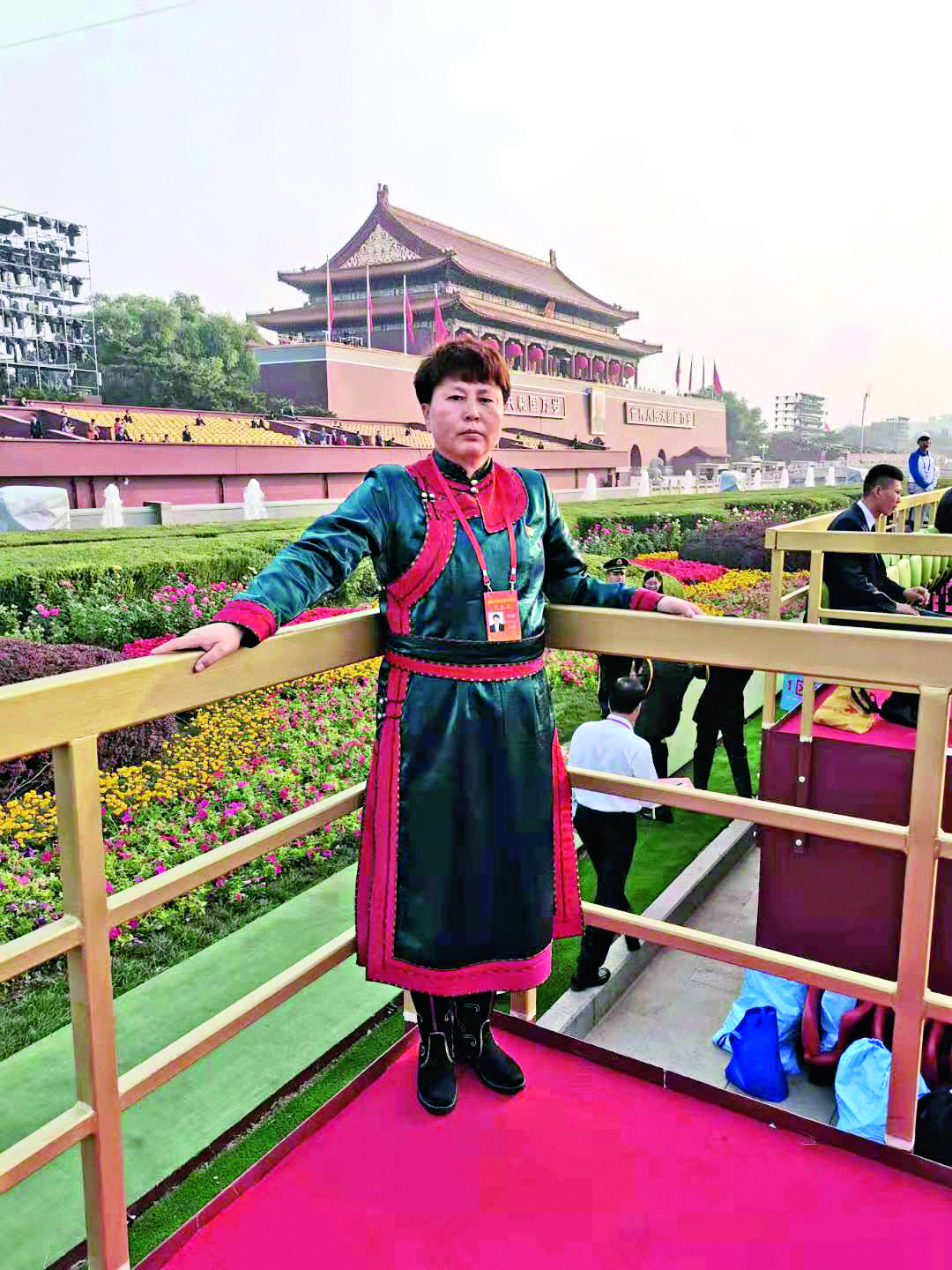 |
| Meng Yajing at Tian'anmen Square, Beijing |
'To Build a Truly Well-off Society, No Ethnic Group Should Be Left Behind'
Xi Jinping, General Secretary of the CPC Central Committee, has stressed that no single ethnic minority group should be left behind in the country's building of a moderately prosperous society in all respects, and no single ethnic minority group should be left behind in achieving the great rejuvenation of the Chinese nation. Xi made the remarks during an inspection tour in Inner Mongolia in July 2019.
With the implementation of national poverty alleviation policies, the three small ethnic minority groups in Inner Mongolia have joined hands with other ethnic groups to achieve a new and historic leap through ecological migration, tourism development and cultural inheritance.
In November 2005, Chaoyang Hunting Village moved four kilometers west of Dayangshu Town, and changed its name to Duobukuer Hunting Village. It is one of the seven hunting villages in the Oroqen Autonomous Banner.
Faced with the impact of modernization and changes to their environment, the former hunters had difficulties keeping pace with the times. Only by finding a new way to develop could this ethnic group continue to grow and flourish.
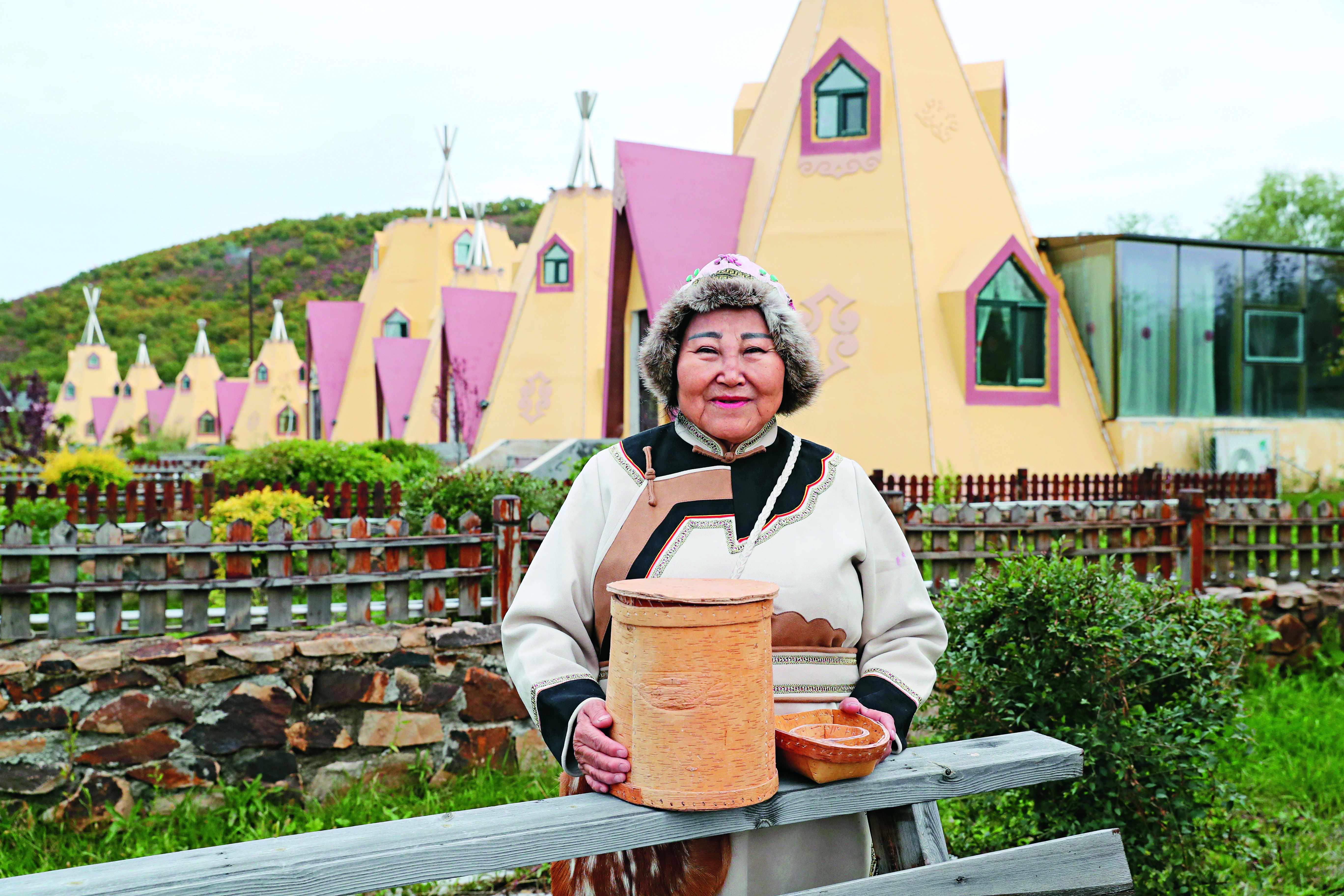 |
| He Pinghua holds a craft made from birch bark. |
How can we find a new development path? Meng began to ponder.
Over the past 40 years of reform and opening up, overwhelming changes have taken place in regards to ethnic relations and within entire ethnic minority communities, while the overall look of the Chinese nation has experienced significant changes under the firm leadership of the CPC. Especially since the 18th CPC National Congress, the CPC Central Committee has attached great importance to the work of improving circumstances for ethnic minorities and ethnic regions. "Foster a strong sense of community for the Chinese nation" has been written into the Constitution of the Communist Party of China, thus propelling China's ethnic policy into a new era.
In order to promote transformational development, the local Party committee and government of Inner Mongolia strongly support the three small ethnic minority groups in making full use of their unique culture and the natural environment to develop the tourism, agriculture, and breeding and poultry industries. The aim is to achieve green development based on ethnic traditions.
Taking advantage of favorable policies, Duobukuer Hunting Village has come face-to-face with new development opportunities, changing the look of the whole village — flat and wide village roads lined with traditional Oroqen-style dwellings extend toward the greenery in the distance.
In front of Duobukuer's village committee there stands a sign inscribed with the motto, "Shaking off poverty and gratefully following the Party forever," which represents the shared voice of 197 villagers from 69 households.
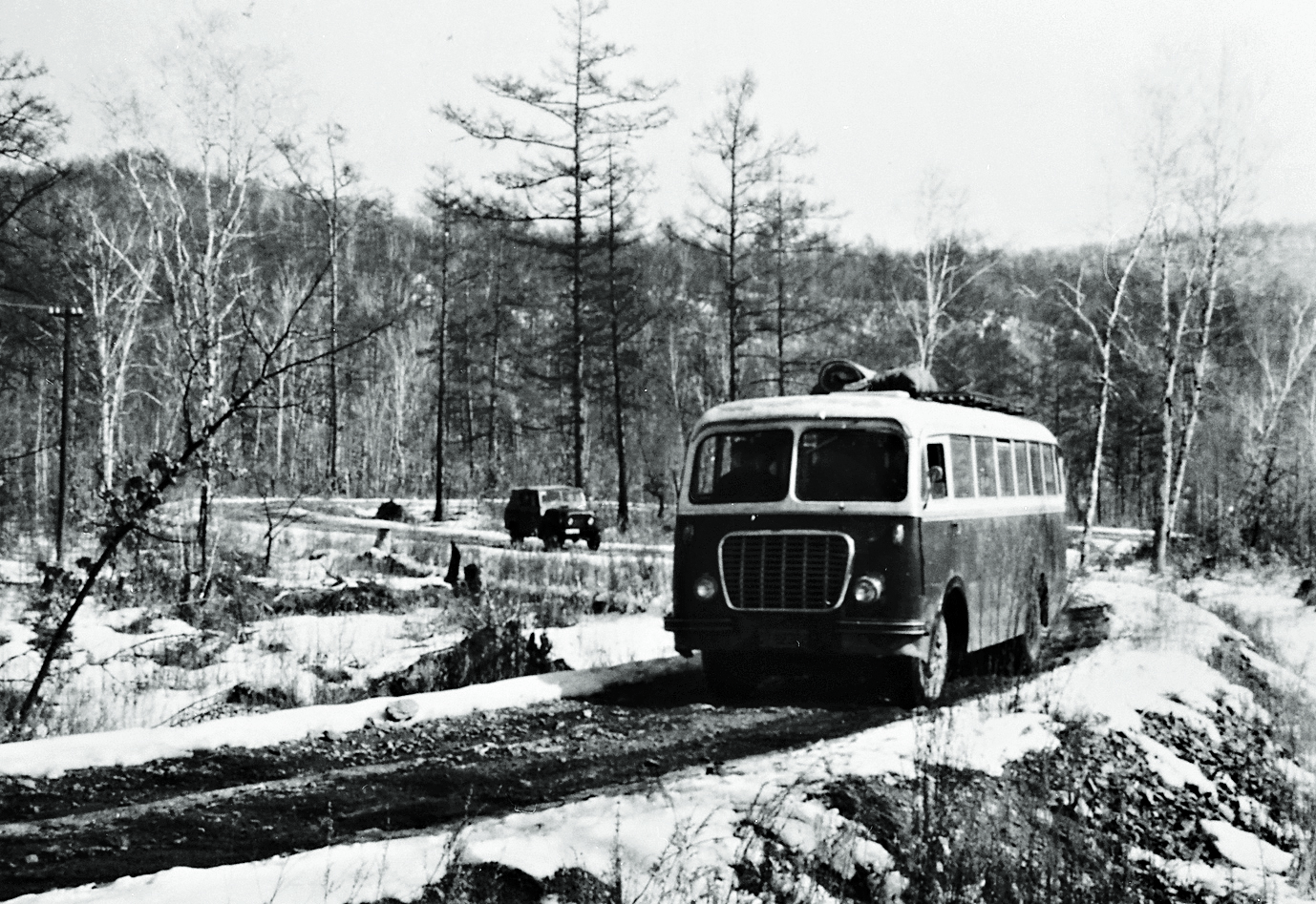 |
| People could travel by bus in hunting towns and villages back in the 1960s. |
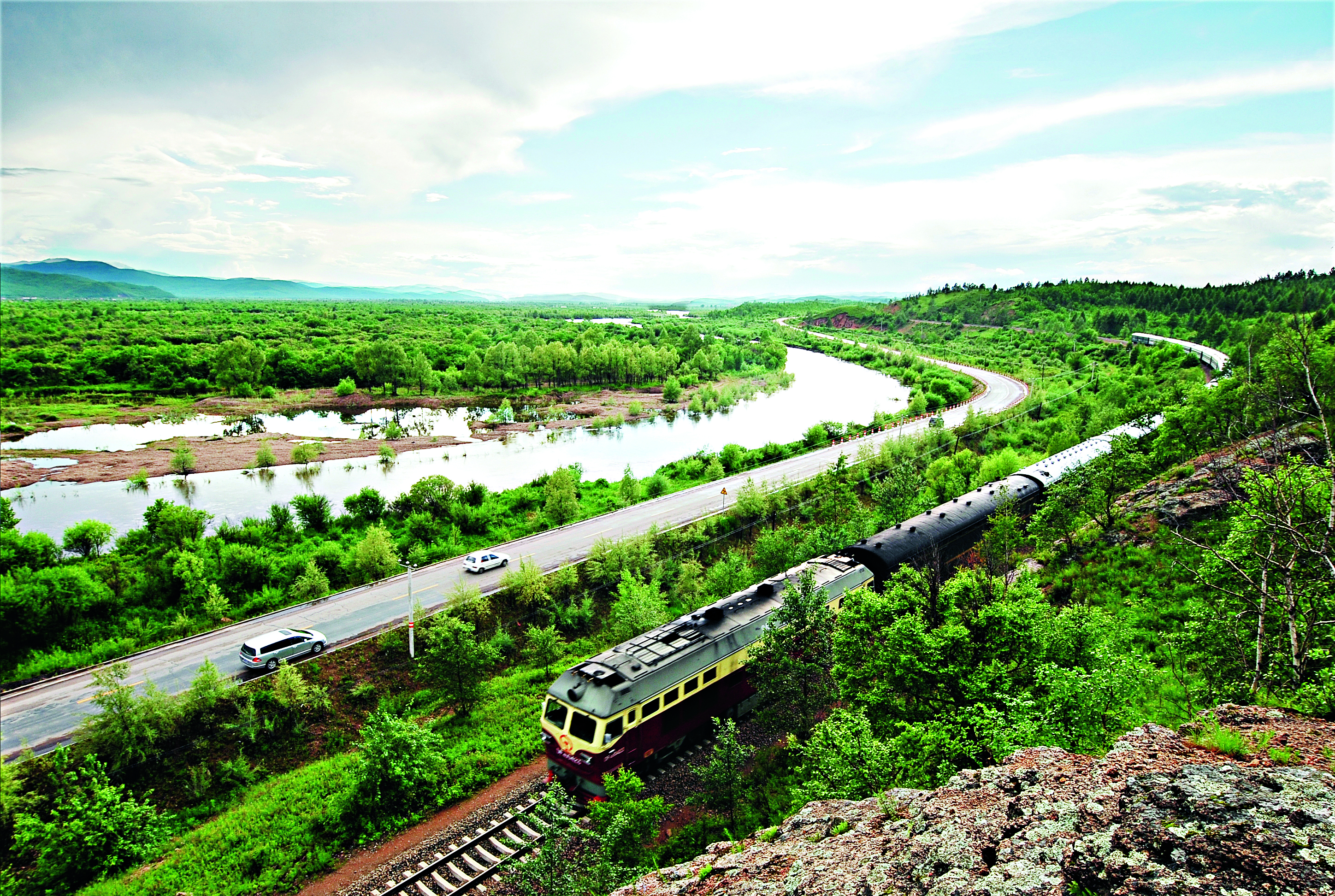 |
| Today's highly developed transportation system includes highways and railways. |
He Pinghua, Meng's 66-year-old adoptive mother, has a lot to say about today's happy life. "I followed my parents down the mountain at the age of 3 and settled in the hunting village of Chaoyang. In 2005, my family moved here and lived in a new house built for us with the support of the CPC and the government. I never even dreamed of such a life before," He said, overflowing with emotion. "Nowadays, life is very convenient. Villagers have medical insurance and children take the bus to school."
Like He, many other elderly villagers have also lived stable and happy lives after relocating, for which they are sincerely grateful to the Party and their country.
'Better Days Lie Ahead for the Oroqen People'
During the period of the 13th Five-Year Plan, Inner Mongolia implemented a poverty alleviation agreement reached between the autonomous region and the Ministry of Transport. The regional government insisted on including the homelands of the three small ethnic minority groups in the scope of the agreement and made strong efforts to promote the construction of arterial roads, which have greatly improved the ease of transportation in the area.
With access to convenient transportation, people of the ancient ethnic group have been able to experience magnificent changes. In 2015, Duobukuer Hunting Village was listed as a pilot village of national poverty alleviation through tourism and has since experienced rapid tourism development. In September 2016, the village was named one of the most beautiful recreational villages in China by the Ministry of Agriculture; in April 2017, it was named one of the villages with Chinese ethnic minority characteristics by the National Ethnic Affairs Commission.
"Relying on the unique culture of the Oroqen, we have built an industrial base integrating agro-ecological parks, traditional breeding and poultry areas, and minority culture tourist attractions." Meng said that the village has built a new tourist spot featuring Oroqen ethnic culture — the Oroqen Duobukuer Hunters Tribe Scenic Spot. The scenic spot has developed into a minority culture resort which has something to offer no matter the time of year.
In recent years, Duobukuer Hunting Village has received no shortage of good news. In 2018, the village was included in the list of 100 special villages nationwide by the organizing committee of the first Chinese Farmers' Harvest Festival, and the village hosted the first Farmers' Harvest Festival in the Oroqen Autonomous Banner; in July 2019, it was recommended as a national rural tourism key village by the Department of Culture and Tourism of Inner Mongolia Autonomous Region.
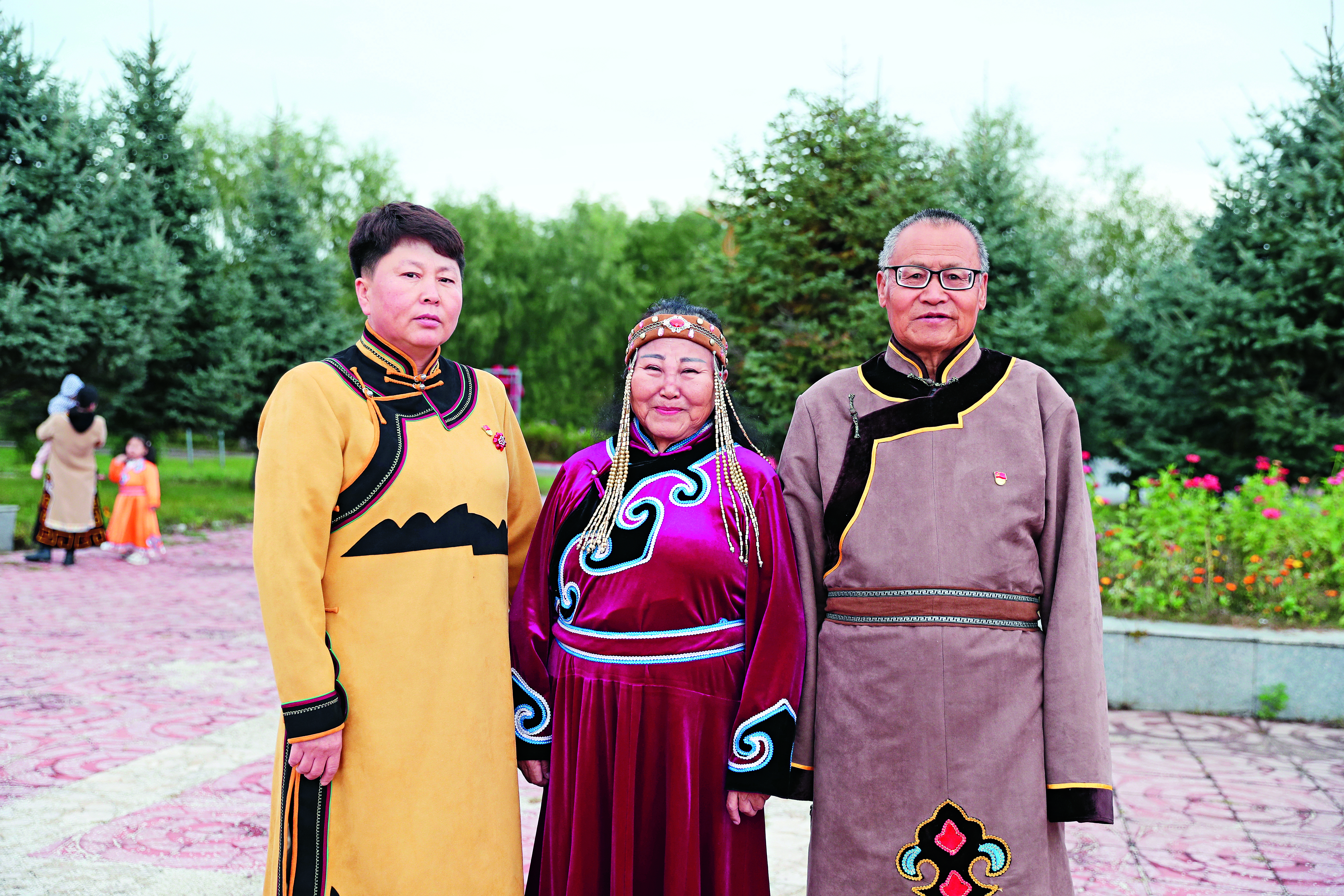 |
| Meng Yajing with her adoptive parents |
For more than 20 years, Meng has been working hard to promote development and advocate ethnic unity in the new era, and she has won the trust and praise of people from various ethnic groups.
On September 27, 2019, Meng was among the 812 people to receive the title of national role model of ethnic unity and progress named by the State Council at an award ceremony in Beijing.
"This honor belongs not only to myself, but to all the Oroqen people, and marks a successful conclusion to my 20 years of work in the village." Meng said after she returned to the village from Beijing, she was given a new post — to work as a cadre at Dayangshu Town's Administrative and Comprehensive Law Enforcement Bureau.
He Zecheng, son of He Pinghua, was tasked with overseeing the development of Duobukuer Hunting Village. "Zecheng, my younger brother, is educated and capable. Under his leadership, Duobukuer Hunting Village has a bright future," Meng said.
In He Zecheng's opinion, what his sister has handed to him is more of a responsibility than a job. "I have seen the way my hometown has improved over the years, and I want to continue this tradition of rapid development," He Zecheng says.
"As a member of the CPC, I will always keep in mind the messages of General Secretary Xi, remain true to my original aspiration, never forget my mission, and do my job well." Meng adds, "I also believe that under the firm leadership of the CPC, better days lie ahead for the Oroqen people."
Photos supplied by Temuerbageb, Bai Hao and Meng Songlin
(Women of China English Monthly June 2021 issue)
Please understand that womenofchina.cn,a non-profit, information-communication website, cannot reach every writer before using articles and images. For copyright issues, please contact us by emailing: website@womenofchina.cn. The articles published and opinions expressed on this website represent the opinions of writers and are not necessarily shared by womenofchina.cn.

 京公网安备 11010102004314号
京公网安备 11010102004314号